Graham Reid | | 9 min read
Mike Stern w Miles Davis: Jean Pierre (extract only)

Guitarist Mike Stern spent time in Miles Davis bands in the early Eighties at a time when Davis – having been absent from the scene – was making yet another comeback. You'd think that would be a wonderfully big tick to have on your CV – and as Stern says below, he loved the experience – but at the time most people, especially critics, were damning.
After the funk of the Seventies, Davis had embraced searing rock textures and Stern, then in his late 20s, was just the man to provide it.
But all that critics heard was noisy rock in a loose jazz context and the album Stern features on – the double live We Want Miles of '81 – was roundly damned.
As a recent Encyclopedia of Jazz noted about Stern's career, with Davis “he often seemed loud and unsubtle in that context”. However then it adds an interesting corollary, “but he was probably no worse than any other fusion-directed guitarist of the day”.
Stern – who had previously been in Blood Sweat and Tears, then played with drummer Billy Cobham before the Davis gigs – went on to a highly interesting, productive and valuable career playing with many of the greats of his generation.
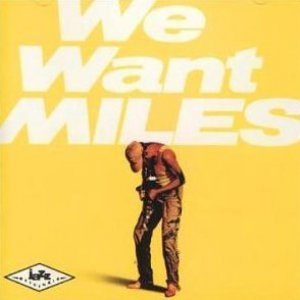 It's also worth noting that same
encyclopedia under its Davis entry says of the trumpeter's bands and
albums in the early Eighties, “this is perhaps the period in Miles'
career that most urgently requires reassessment. Yes, he had been ill
and out of circulation. No, these are not classic records. In
retrospect though, they sound much closer in spirit to the Miles of
1960 than to the Miles of 1970”.
It's also worth noting that same
encyclopedia under its Davis entry says of the trumpeter's bands and
albums in the early Eighties, “this is perhaps the period in Miles'
career that most urgently requires reassessment. Yes, he had been ill
and out of circulation. No, these are not classic records. In
retrospect though, they sound much closer in spirit to the Miles of
1960 than to the Miles of 1970”.
If there is a reassessment then Stern – who comes to New Zealand to perform with the Rodger Fox's Wellington Jazz Orchestra alongside fellow American's Joey De Francesco (organ, trumpet) and singer Brenda Boykin, see dates below – always figured there would be.
Miles had told him that.
So at 60, Mike Stern can look back on a long career which started when he was seduced by rock guitar heroes, then he moved into jazz. It's a career still filling his days and nights.
So Mike, are you busy before you come down here?
I'm going to Japan and I'm playing with Eric Johnson who is sort of a blues rocker and we've never done anything together except his own records. So that's happening. Playing with him, then Japan.
Have you ever been to New Zealand before?
I've been once with Blood Sweat and Tears in the Seventies and not since then, at least not that I can remember. Some of those years are hard to remember. (laughs) I remember that I came in the Seventies though, and it is a beautiful country I remember that too. So if I'd been again I would remember.
In regard to coming here, do you exchange charts with Rodger Fox in advance? That is what you would do for shows like these?
Something like this with a big band, yes. I sent him some charts that were already done by somebody else – I didn't write them, but I wrote the tunes. So the songs are mine and they been arranged for a big band. I think he'll use those – or maybe they've got some other writers.
That's generally what I've been doing.
I don't do that much big band stuff. It's not usual for a guitar player to be invited to do that kind of thing but I've been doing more and more because it's working out really well when I do. So I've done things with the WDR, a very famous big band in Germany, and the Danish Radio Big Band . . . and the Frankfurt Big Band in Germany also.
And also with the [Dutch] Metropole which is a 50-piece orchestra with strings. I've done a project with them. Hopefully I'm going to do another because that was a while ago. They are still going for another few years but then I think they are not going to have the funding to do it, and that's a shame because it is an amazing orchestra. There aren't many like that anymore.
But this is going to be great fun because I've heard great things about this band and Rodger Fox. We tried to hook it up last year and it didn't work out.
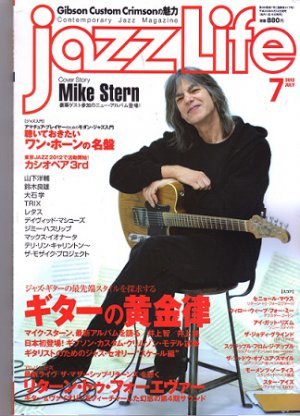 Do you like playing with big bands?
Do you like playing with big bands?
Oh, I dig it man. It's really fun.
You don't feel your space crowded?
Nah, nah. They let me plaaaay. And I like to open it up so everybody else can play, or as many people as possible.
You've played with Joey before?
Just a little bit here and there, not projects for just us but we were involved in the same things. And we just jammed . . . and he is amazing.
Yes, I've seen him in New York with John McLaughlin and was absolutely blown away by his power and energy.
Yeah. We actually played a project with John. It was my band, then his thing with John and then Richard Bona did something. It was kind of an all-star guitar night and Joey was on it, and he was killing. He's such a great trumpet player too. He plays the hell out of it.
I'm not sure if on the show we are playing together though, hopefully we will and I'm sure we'll figure it out. He is awesome.
You are my age Mike and are of what I would loosely call the rock generation, the ones that grew up with the Beatles and the Rolling Stones and all that.
Yeeeeahh. And I'm still into them. (laughs) So are most people I know, and so are most kids I know actually. They like that better than some of their own stuff.
Given that, in your pre-jazz life when you were a kid, who were your role models on guitar?
At that time it was anybody who played with John Mayall for me. Peter Green, Eric Clapton. . . Mayall had all the blues-rockers, great musicians. Then was into Clapton and the Cream, then Jimi Hendrix of course and Jeff Beck . . . which I still dig because those cats were for real. And the ones that are still alive are still for real. They were happening and wonderful musicians in their own format of what they played.
They are not beboppers – I love bebop and that's where my heart is most of the time but of course I'm into rocking because I came up in the Sixties.
Then of course Jimmy Page in Led Zeppelin. I was listening to that at first, but then a whole bunch of blues player. All the Kings – Freddie, Albert and BB – and Buddy Guy. I used to listen to a lot of Motown. I grew up in Washington DC so there was a lot of Motown soul on the radio and I got into that.
Then I got into jazz. My mom was always playing classical music and some jazz, so I kind of got into jazz that way, and with friends of mine we really started falling in love with it.
That's the question: you are of that era of rock guitar heroes yet moved across to jazz. What was it in jazz you found that you couldn't get by being a guitar hero yourself?
I think it is the swing kind of feeling. And the openness of the music. It is more intricate too in terms of the chords and scales. But I guess that's in music in general. It is just a lot more in your face with jazz to a certain degree.
That actually may have discouraged me more than encouraged me (laughs) but the feel was so good and the idea that the genre lent itself to. It pushed me. I got into it because I felt I was in a rut in rock and wanted to see what more I could come up with and thought I'd get into jazz because I liked it.
But I also thought I'd never be able to play it in a way that I wouldn't be self-conscious. I thought I wouldn't be able to play it like I could play the blues because that was a straight-up Chicago style. I didn't think I would be able to think of all those chords.
Then the more I got into it the more I thought, 'Let me try to get this'. The more you learn the language the more fluent you get.
So then I felt I could play a melody over some chords without having to think of those chords.And of course it is endless and there are so many different ways of approaching things that you could play forever and still won't know shit.
So you did your homework on Charlie Christian and so on?
All of that, and I still do. Like crazy. Wes Montgomery who is the most swinging cat, Jim Hall, Joe Pass . . .
What I've been doing for years though is checking out instruments other than guitar. I'm always checking out other guitar players of course, especially those guys I mentioned and players who are my age who play jazz or different stuff. Like Eric Johnson who is a blues rocker, but I also just did three weeks with John Scofield – and we'd played together with Miles, and we'd played together even before then. He's always been a favourite of mine and we played some gigs together and it was a blast.
But for years I listened to more horn players than guitarists. I'd get ideas from them and get them transcribed and try to get those ideas onto guitar, which you can't really play but you can get something of it so it just sounds fresh on the instrument because it's not coming directly from the instrument itself.
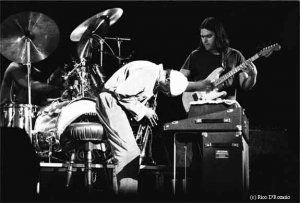 You mentioned Miles Davis. That must
have actually been a difficult period for you in a way in that he was
unwell and struggling. And that rock-fusion at the time was not well
received by jazz critics. Do you look back on that period fondly?
You mentioned Miles Davis. That must
have actually been a difficult period for you in a way in that he was
unwell and struggling. And that rock-fusion at the time was not well
received by jazz critics. Do you look back on that period fondly?
Definitely. I loved it. People will say what they say, and Miles would always say people will catch on 10 years later with what he was doing. And that was kind of what happened. I wanted to play more bebop and he wanted me to rock. He liked the fact I was playing lines, but he wanted the volume.
I thought we could split the difference maybe and he would say 'No, no. Let's rock.' And he'd always say, 'Play me some Hendrix'. What he meant was, 'Play your stuff, but with that attitude'. So I was playing a lot of lines and there was rock in there because I come from that.
It was great experience playing with him, he played so much from the heart. People say what they say but they've all turned around and people are discovering it now. He was always ahead of the time. And that always invites criticism. But he always told me, 'Don't worry about [criticism]'. So it was a great experience and the only thing is . . . Well, I finally did it sober. (laughs)
I was really messed up in those days and for some of it I was pretty trashed. But, for all that, some of it still came out good. Miles had a way of getting stuff out of people. Then I went back with him and the band was a bit different with keyboard players. That first group was really open with just guitar.
Then Sco [Scofield] played with us for a while. Me and Sco played together in that band, then I left and Sco did it for a while, then Miles added keyboards and I went back with that band when Sco left.
It was still a great vibe but it was a little more structured, which is cool. But I liked the first band which was really open and fun.
All of it was great because I got to play with him and Jaco Pastorius and Michael Brecker. It was amazing.
One of the things about guitar players – you've mentioned Beck and Clapton and we could put Steve Vai, Sco and yourself in this – is that, aside from the obvious example of Jimmy Page in Led Zeppelin, guitarists move on very quickly from bands. I guess in your case that isn't so unusual in the jazz world where players do that, but is there something which especially pertains to guitarists? They are the restless kind?
Probably. (laughs) I think one things about guitar it lends you to an open mind because it is everywhere. It's such a popular instrument that you hear it in country, rock, pop, classical and jazz . . . So you hear it in different genres and you relate to it immediately. It is prevalent, so whatever your priority – mine is jazz, whatever that means because it is such a big word – that basically keeps people moving musically. Guitar players want to keep trying different things, that's especially true with jazz players. But you do also see that in rock players.
And if you are around as long as Clapton, you do kinda want to move on. Some of those groups weren't together very long. The Beatles weren't together that long, Hendrix was only famous for three years and he changed his band completely in that time.
But you keep your own voice and can come back to some of the same players, and that's a normal thing for jazz players. But you do keep your own voice.
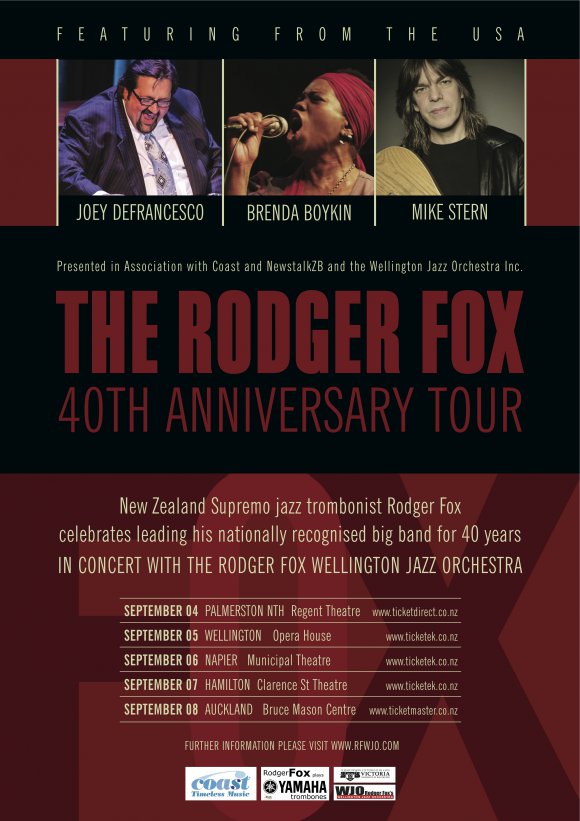


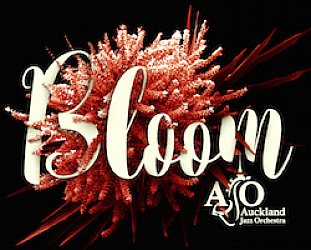
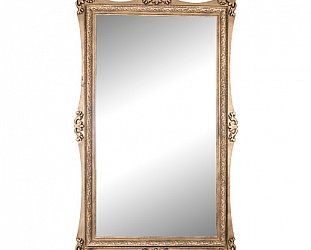
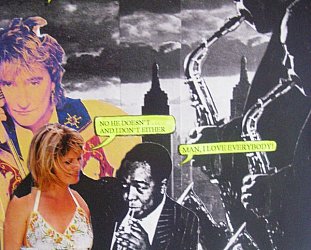
post a comment